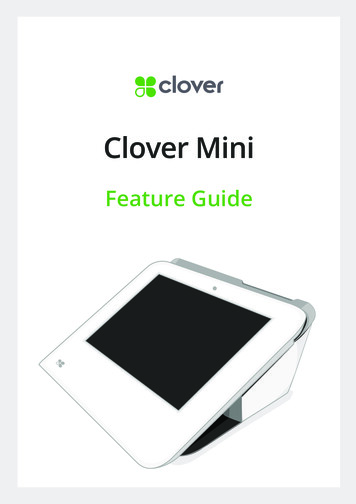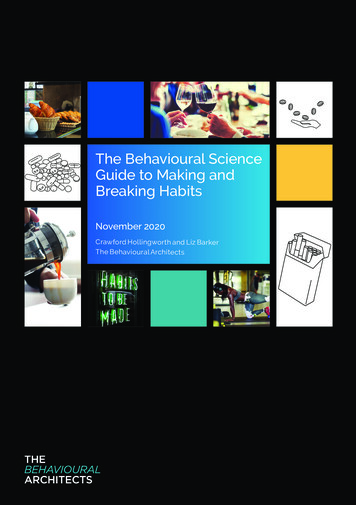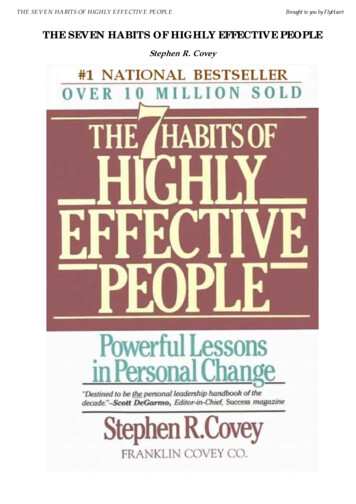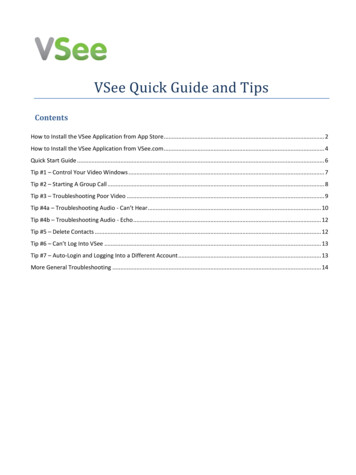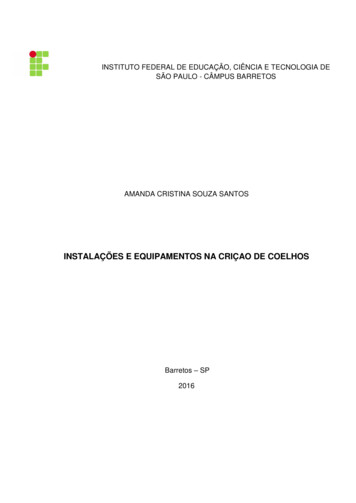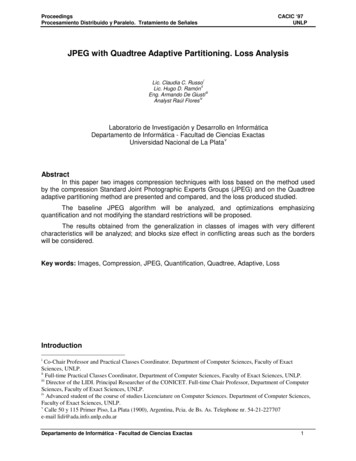
Transcription
Mini HabitsSmaller Habits, Bigger Resultsby Stephen Guisewww.deepexistence.comPrimary blog – focusing, habits, small steps, etc.www.minihabits.comSupplemental book information
Copyright and DisclaimersMini Habits by Stephen GuiseCopyright 2013, All Rights ReservedLegal Disclaimer:The information contained in this book is the opinion of the author and is basedon the author's personal experiences and observations. The author does notassume any liability whatsoever for the use of or inability to use any or allinformation contained in this book, and accepts no responsibility for any loss ordamages of any kind that may be incurred by the reader as a result of actionsarising from the use of information found in this book. Use this information atyour own risk.The author reserves the right to make any changes he deems necessary to futureversions of the publication to ensure its accuracy.
PrefaceI had experimented with personal development strategies for a decade. When Iaccidentally started my first mini habit in 2012—and the changes I made wereactually lasting—I realized the prior strategies I relied on were completefailures. When something works, that which doesn’t work is exposed.The science in this book exposes the most popular personal growth strategies aspredictably inconsistent, and shows why mini habits are the most effective andreliable way to build healthy new habits.When you finish reading Mini Habits, and then again after you start your firstmini habit, you’ll wonder why nobody told you about this strategy before, andwhere it's been all your life. Well, hey, nobody told me either. But let’s focus onyour bright future, because this book will better equip you to change your lifethan 99% of the people you see walking around on this globe—people who thinkthat they are the reason they can’t achieve lasting change. But the truth is muchless dire—the problem isn’t with them, it’s with their strategy.
How This Book Is StructuredThere are seven major parts in Mini Habits. The end goal of this book is to helpyou permanently add healthy, habitual behaviors to your life. The first threeparts discuss habit-building, the brain, willpower, motivation, and how theyrelate with one another. The next two parts discuss logical and scientificconclusions about how to best utilize this information. The last three parts showyou how to apply it. Here are the seven parts in greater detail.1. Introduction To Mini HabitsHere, you'll find out what a mini habit is. This part includes the story of how Ifirst made one push-up a full workout (which became a mini-phenomenon called“The One Push-up Challenge”). We'll also explore why habits are so critical toactively develop.What it establishes: what a mini habit is, the importance of habits, and how Istumbled upon my first mini habit.2. How Your Brain WorksIn part two, we're going to take a look at the human brain. Understanding thebrain can help tremendously in new habit formation, because you can employsuperior strategies with this knowledge. We'll learn about the active and passive(i.e. conscious and subconscious) parts of the brain, and how they work togetherto shape our daily behavior.What it establishes: the inner workings of the human brain as it relates tobehavior change and creating new habits.3. Willpower Vs. MotivationWe have two strategies for taking action—either get motivated so that we wantto complete the task or force the issue by using willpower. Is one better than theother? Do we use both? Science reveals the winner, and suggests the single bestway to apply it.
What it establishes: why it's best to use willpower exclusively (with mini habits)and ignore motivation altogether.4. The Strategy of Mini HabitsThe first three parts laid the foundation for this concept of tiny, daily actions; inthe next two parts, we’ll discuss why that is the case and how it should work.Mini habits are most effective with the proper mindset, and this part gets youinto that mindset.What it establishes: the connection between the Mini Habits strategy andeverything we've learned about habit change to this point.5. The Mini Habits DifferenceThis part delves into the advantages of the Mini Habits strategy’s differences andhow it can work for you when others haven’t.What it establishes: all that makes mini habits uniquely effective.6. Mini Habits – Eight Steps To Big ChangeThese eight steps will show you how to choose your habits, plan your journey,and take your first small steps forward. Each step is broken down into detail,explaining exactly why it's necessary, different strategies to employ, and how tobest execute.What it establishes: how to apply mini habits to your life, from the “I want tocreate a new habit” stage to success.7. Eight Mini Habit RulesThis last part covers the eight rules of the Mini Habits strategy. These rules willkeep you on track and ensure you maximize your potential and results.
What it establishes: the rules of mini habits that will help you get great resultswhile avoiding habit-breaking mistakes.***Are you ready to discover how smaller habits lead to bigger results? I sure hopeso, because I'm excited to show you. Let's go!
Table Of ContentsPart 1Introduction To Mini HabitsHow It Began: The One Push-up ChallengeFor Good Habits OnlyA Brief Synopsis Of Mini HabitsAbout Habits And The BrainPart 2How Your Brain WorksSlow-Changing, Stable BrainsA Stupid Repeater & A Smart ManagerThe Prefrontal CortexThe Basal GangliaPart 3Motivation Vs. WillpowerThe Many Problems With “Getting Motivated”Why Willpower Beats MotivationHow Willpower WorksPart 4The Strategy Of Mini HabitsUsing Willpower The Mini Habits WayHow Mini Habits Expand Your Comfort ZoneThe Two Moments Of ResistanceMini Habits In The Moment
Part 5The Mini Habits DifferenceMini Habits Can Compete With Your Existing HabitsSmall Steps & Willpower Are A Winning TeamOther Methods Will Tell You It's Ok To Let Up Too SoonMini Habits Increase Your Self-efficacyMini Habits Give You AutonomyMini Habits Marry The Abstract & ConcreteMini Habits Destroy Fear, Doubt, Intimidation, & HesitationMini Habits Create Insane Bonuses Of Increased Mindfulness & WillpowerPart 6Mini Habits – Eight Small Steps To Big ChangeStep 1: Choose Your Mini Habits & Habit PlanStep 2: Use The Why Drill On Each Mini HabitStep 3: Define Your Habit CuesStep 4: Create Your Reward PlanStep 5: Write Everything DownStep 6: Think SmallStep 7: Meet Your Schedule & Drop High ExpectationsStep 8: Watch For Signs Of HabitPart 7Eight Mini Habit Rules1. Never, Ever Cheat2. Be Happy With All Progress3. Reward Yourself Often, Especially After A Mini Habit4. Stay Level-headed5. If You Feel Strong Resistance, Back Off & Go Smaller6. Remind Yourself How Easy This Is7. Never Think A Step Is Too Small8. Put Extra Energy and Ambition Toward Bonus Reps, Not A Bigger RequirementFinal WordsAn Optional ModificationApply This Strategy ElsewhereWant More?
Introduction To Mini Habits“The journey of a thousand miles begins with one step.” — Lao TzuLet's begin your first mini habit.Read at least two pages of this book every day until you finish it. You may readmore than that, but never less. It won’t require much time or effort to read twopages, so there are no excuses. Now you can experience what it's like to have amini habit as you read about mini habits.Touch your nose right now. I'm serious. I’ll explain later. Ok, now think aboutwhat the following truths mean for your life:1. Big intentions are worthless if they don't bring results. For example, I can saythat I will exercise for two hours every day, but if I never do it, the size of theintention doesn't matter. In fact, intention without action harms self-confidence.2. People have been shown in studies to chronically overestimate their selfcontrol ability.1These two simple points reveal why so many people struggle to change. Theyhave big ambitions, but overestimate their ability to make themselves do what it
takes to change. It's a mismatch between desire and ability.Here are two more facts to consider:1. Doing a little bit is infinitely bigger and better than doing nothing(mathematically and practically speaking).2. Doing a little bit every day has a greater impact than doing a lot on one day.How much greater? Profoundly so, because a little bit every day is enough togrow into a lifelong foundational habit, and those are a big deal, as you'll see.If these statements seem reasonable to you, the main conclusion to draw is thatsmall intentions are better than big intentions. Interesting, right? We're justgetting started.Have you ever felt stuck? Have you ever tried to change yourself for the betterand failed? Have you done it over and over again, and even stopped trying forlong periods of time?We've all been there, I think, but let me ask you these more interesting questions.What if your failure to take action and stick to your plan was never a problemwith you, but a problem with your strategy—the strategy that most of the worlduses and endorses? And what if the science about human behavior, willpower,and the brain suggested a better alternative for sticking to your plans—one thatis rarely practiced or promoted? And what if a shift to this new strategy changedeverything for you, and no matter how you felt, you knew you could take action,reach your goals, form good habits, and change your life?Welcome to the world of mini habits.It all sounds overblown, I know, but you just read my mini-autobiography upthere. This is the exact reality and the revelation that transpired for me starting inlate 2012. The previous ten years of my life were a constant search and struggleto grow, with disappointing results. But then I tried something that produced abreakthrough unlike I had ever experienced before, so I scrambled to understand
exactly why this odd strategy worked so well, and I was (and am still) amazed athow everything fits together. And now here's this book.We're quick to blame ourselves for lack of progress, but slow to blame ourstrategies. Then we repeat them over and over again, trying to make them work.But here's the thing—if you fail using a particular strategy more than a fewtimes, you need to try another one. It doesn't matter if it works for everyone elseif it doesn't work for you! This is a lesson I wish I had learned years ago.I asked you to touch your nose earlier because I wanted you to prove somethingto yourself. First, notice that there's no reward for touching your nose. Second,consider that you did it anyway because you can. If you didn't do it then, do itnow so the following words apply to you (or choose another small action ifyou're one of those stubborn types).You were able to touch your nose because the resistance you felt was notstronger than your willpower. Congratulations! You are now Mini Habitsapproved.That was a rudimentary exercise in willpower. If you can force yourself to touchyour nose, then you can have success with this book's strategy. I’m not joking.This book exists because I did one push-up on December 28, 2012. My ability todo 16 pull-ups in a row and my improved physique result from that same pushup. I read and write every single day because of that push-up. That one push-upwas the first step that lead to all of these great changes in my life.Every great accomplishment rests on the foundation of what came before it;when you trace it back, you'll see one small step that started it all. Without thatone push-up, I'd still be struggling to get motivated to go to the gym, and to readand write consistently. That push-up lead me to discover this new strategy, whichturned into these great benefits. Are you ready to hear the story of the one smallaction that changed everything for me?
How It Began: The One Push-up ChallengeI'm thinking about naming it “the golden push-up.”It was December 28, 2012 and the new year was near. Like many others, Ireflected on 2012 and was not impressed. I wanted to live better in 2013; my topdesire was fitness. I wasn't about to set a New Year’s resolution though—I haddecided against them years ago, because they have an abysmal 8% success rate.2I felt like I had better odds of winning in Las Vegas than in life. Ever since mylater years of high school, I had tried to make exercise a habit. But for ten yearsit never stuck, despite my efforts. Those aren't the type of results to instillconfidence in oneself! My motivational bursts to change would usually last meabout two weeks before I'd quit for one reason or another. Sometimes there wasno reason; I'd just stop. Wanting to do something before the arbitrary January 1ststarting point associated with resolutions, I decided to start by exercising rightthere on the spot for 30 minutes.But I stood motionless. I couldn’t get motivated. I went through my usual “getmotivated” routine. Come on Stephen, true champions put in the extra work. Itried listening to up-tempo music, visualizing myself with a great beach body,etc. Nothing worked. I felt out of shape, lethargic, and worthless to the point thatI couldn't do anything. A 30 minute workout looked like Mount Everest. Theidea of exercise was wholly unappealing. I felt so defeated, and I was.It wasn't just the time or the effort of a 30 minute workout that intimidated me, itwas the total amount of work I needed to put in to reach my fitness desires. Itwas the vast distance between here and there. A year's worth of workoutsweighed on my mind. I felt guilty, overwhelmed, and discouraged before I hadeven done anything!
The Turning PointMonths earlier, I had read a fantastic creative thinking and problem-solving bookcalled Thinkertoys by Michael Michalko. One of the creative thinking “toys” hetalks about is called False Faces. In False Faces, you consider the opposite ofwhat you're currently thinking, and see what creative ideas emerge from that. Acrude example: instead of building a skyscraper, what if you built a structuredeep into the earth? This generates creative ideas by forcing your mind to zoomout and see the spectrum of possibilities.I had a problem to solve, and this technique popped into my head, so I thoughtabout the opposite of a 30 minute workout. Eating ice cream and watching TVwould be one opposite of exercise. Then I considered that a full 30 minutes justseemed like such a huge challenge in that moment (i.e. Everest). Anotheropposite, I considered, could be the size of the workout. What if instead of thisbig 30 minute commitment of sweat and discomfort, I did a single push-up? Iwould have no requirement to do more—just one push-up. It was the trueopposite of my Mount Everest workout.I laughed off the idea, literally. How pathetic! One push-up isn't going to helpanything. I really need to put in more work than that! But every time I switchedback to my first plan, I couldn't do it. After I got tired of failing to do the 30minute workout, I thought, Whatever, I'll do one push-up. I got down on theground, did one push-up, and changed my life for good.When I got into push-up position, I noticed it was exactly the same as the start toan actual 30 minute workout. I did my push-up; my shoulder popped, my elbowsneeded WD-40; it felt like my muscles were waking up from an 24 year nap. Butwithout pause I did a few more, because I was already in position. Every pushup was rough on my underused muscles and my anxious brain. As I stood up, Iconcluded that it was better than nothing. Mind you, I still felt like quitting atthis point. But then I had the idea to set another small challenge of one pull-up. Itwas too easy to turn down. I got my pull-up bar set up and did one. Then I did afew more. Interesting, I thought, this is hard, but not as hard as I was making itout to be.My muscles were warming up. My motivation to do more had definitely
increased, but it was so low to start with (and I was so out of shape) that I stillhad plenty of internal resistance. I continued on with the same strategy, going assmall as necessary to continue. During one push-up session in my workout, I hadto set seven micro goals like so: ok, one more, ok, two more, now one more.Every time I baited myself with a beyond-easy challenge, I met or exceeded it. Itfelt nice to meet a goal for a change.When I finished, I had exercised for 20 minutes, and felt great about it. Usuallyat this point in a workout, I'd complete a ten minute ab exercise video. When thethought crossed my mind, my brain promptly shot it down like a digital bird inthe video game Duck Hunt, saying, you had your fun, but don't push your luck.But you can probably guess what I did next. I decided to set up my floor mat.Brain accepted that. Then I decided to find an ab video. Brain accepted. Then Idecided to press play. 10 minutes later, my abs were ablaze. It's important to notethat these were individual decisions. At no point did I have the full weight ofcompleting a 10 minute ab-ripping program on my mind. If I had, I would havenever done it.The day after I had turned one push-up into the impossible-seeming 30 minuteworkout, I wrote “The One Push-up Challenge.” It turned into one of my mostpopular posts to date. I still receive messages from people telling me how it'shelped them to exercise consistently.As 2013 went on, I continued to require one push-up per day from myself.Usually, I did more than one. But one day I forgot until I was already in bed. So Iflipped over onto my stomach and did my one push-up in bed. I laughed at thethought of meeting the daily requirement at the last second. It soundsmeaningless, but it actually felt amazing to succeed so easily and keep the streakalive. Later, I would see how important this was for my success.I noticed two things. First, just a few push-ups a day does make a difference inhow you feel, physically and mentally. I felt stronger and my muscles werebetter conditioned. Second, I realized that exercise was becoming habitual; evenwith such a wimpy challenge, I was doing something every day. Regularworkouts were becoming easier. With this positive experience under my belt, Iwas curious whether a scientific explanation existed for why super small steps
were working better for me than larger goals. Research showed that there isindeed, and you'll see it peppered throughout this book. There's no single studythat says “mini habits are the answer.” Instead, this philosophy of habit-buildingrests on the shoulders of dozens of studies that have revealed the nature ofwillpower and the brain, and what it takes to take consistent action.Starting in late June, I made the jump from home to gym, and I've built a fewpounds of muscle since then. On September 20th, I realized the potential of thisformula for other areas of my life, such as reading and writing. I've amazedmyself since then by increasing my productivity and staying in great shape. Allof the things I've been wanting are happening now. Recently, I’ve even startedeating mega salads just because I want to do it. When you invest in yourself inkey areas like fitness and learning, you tend to do it in other areas too.
For Good Habits OnlyBefore we get any further, I want you to understand that this book will not helpyou quit smoking or control a gambling addiction. Mini habits are for goodhabits only—adding positive behaviors to your life to enrich it for years.Breaking bad habits and making good habits do have the same goal—replacing adefault behavior with a better behavior. With bad habits, your primarymotivation for change is an away response from something bad. With goodhabits, your primary motivation for change is a toward response to somethinggood. Mini habits focuses on the toward response.Changing deeply-rooted active bad habits like substance addiction involves adifferent psychological process and may require professional assistance. Thatsaid, if you're looking for a long-term play to help with passive bad habits suchlaziness, fear, or wasting time, then this book can help you tremendously.Passive bad habits can often be marginalized by incorporating good habits intoyour life. How can you continue with your bad habits if you spend all of yourtime on good ones? And honestly, adding good habits this way is pretty easy todo. Quick fixes are often bogus, but when you've literally been fighting againstyour brain for a decade (or more for some of you), then a strategy that workswith your brain will be easy in comparison. With the right knowledge andstrategy to change, what previously seemed impossible becomes ratherstraightforward and possible. It's like trying to open a locked door—it's onlyeasy if you have the right key (or are a locksmith or thief, but now the analogy istoo complicated).That said, those covered in darkness (probably because of their bad habits) needlight in their life too. If your life is a complete mess of bad habits, adding insome good habits can change you. Darkness is not something that exists on itsown—it's the name we give for the absence of light. Perhaps people have badhabits because they lack the light of good habits, which permits a dark void intheir life. When you add good habits into your life, it illuminates another
possible path, restores your confidence, and gives you hope. It also serves as abrilliant foundation from which to build.This information doubles as a life philosophy that demonstrates, explains, andcelebrates that the first step forward is always the most important one by far. Inother words, it can help you in other areas besides your habits. I don't merelyhope that this book will help you, I'm confident that it will as confident as I amthat most people’s New Year's resolutions will fail. That is, it's a high statisticalprobability. With mini habits, you can join the ranks of people who change theirlives in the most unbelievable way.
A Brief Synopsis Of Mini HabitsSince I refer to mini habits throughout the book, I want to briefly explain theconcept. A mini habit is basically a much smaller version of a new habit youwant to form. 100 push-ups daily is minified into one push-up daily. Writing3,000 words daily becomes writing 50 words daily. Thinking positively all thetime becomes thinking two positive thoughts per day. Living an entrepreneuriallifestyle becomes thinking of two ideas per day (among other entrepreneurialthings).The foundation of the Mini Habits system is in “stupid small” steps. The conceptof small steps is nothing new, but how and why they work have not beenadequately dissected. Of course, small steps are relative too; a small step for youcould be a giant leap for me. Saying “stupid small” clarifies it, because if a stepsounds stupid relative to the most you can do, it's perfect.The power of the Mini Habits system is in the application, mindset, built-inpositive feedback looping, naturally increasing self-efficacy, and of course,leveraging small steps into habits. This will be explained, but it's also built in;it's a simple system with a complex, smart backing.The way we act on these mini habits is by using a small amount of willpower toforce ourselves to do something. It doesn't take a lot of willpower to do onepush-up or come up with a couple of ideas.The benefit from following the Mini Habits system is surprisingly big results.First, there's a great chance that you'll do “bonus reps” after you meet your smallrequirement. This is because we already desire these positive behaviors, andstarting them reduces internal resistance. The second benefit is the routine. Evenif you don't exceed your small requirement, the behavior will begin to become a(mini) habit. From there, do bonus reps or scale the habit up. Another benefit isconstant success. A bank may be too big to fail, but mini habits are too small to
fail; and so they lack the common destructive feelings of guilt and inadequacythat come with goal failure. This is one of the very few systems that practicallyguarantees success every day thanks to a potent encouragement spiral andalways-attainable targets. Mini habits have made me feel unstoppable; prior tostarting mini habits, I felt unstartable.To summarize, a mini habit is a VERY small positive behavior that you forceyourself to do every day. Small steps work every time, and habits are built byconsistency, so the two were meant to be together. Hey, it’s still a better lovestory than Twilight.
About Habits And The BrainWhy not just use small steps in daily life? Well, you absolutely should! Buthabits are the framework of your life, so to ignore them is a pretty big mistake.When I discovered the power of small steps from the One Push-up Challenge, Ifelt like a superhero who had just discovered his superpower and wondered,How can I use this for the greatest good? Habits were the answer.This book focuses on using small steps for habits because there is nothing moreimportant than your habits. A Duke University study concluded that about 45%of our behavior is from habit.3 They are even more important than this 45% stakesuggests, because habits are frequently repeated behaviors (often daily), and thisrepetition adds up to big benefits or big damage in the long run.The habit of writing 1,000 words per day would result in 365,000 words writtena year. That's equal to seven 50,000 word novels. Though it would be shy of LeoTolstoy's 580,000 word behemoth War and Peace (that guy sure had a lot tosay).Consider these classic novels that weigh in at about 50,000 words each: Douglas Adams' The Hitchhiker's Guide To The Galaxy (46,333 words) Stephen Crane's The Red Badge Of Courage (50,776 words) F. Scott Fitzgerald's The Great Gatsby (50,061 words)Now, you may not write a novel of such world renown on the first try (or thefirst 100), but if you write seven per year, you'll have quite a few attempts toperfect your craft, right?
More potentially life-changing habits: The habit of exercising 20 minutes a day is enough to change your physique. The habit of eating healthier foods may add years to your life (and give youmore vitality throughout). The habit of rising one hour earlier each morning to read would give you 365extra hours more per year. At the average reading speed of 300 words perminute, this extra time would allow you to read 6,570,000 words, or 131 more50,000 word books per year. That's a LOT of books, and a sure way toincrease your knowledge.There are also less concrete examples such as thinking positively and beinggrateful, that can have a dramatic impact on your life. With mini habits, this“store” of life perks is now open for business. Choose your favorite habits andadd them to your cart. For more mini habit ideas, visit minihabits.com. But wait,come back here! You've got to finish the book before you get too carried away.There's important information ahead that will help you succeed.***Merriam-Webster's dictionary defines a habit as “a usual way of behaving :something that a person does often in a regular and repeated way.” Since I tendto think in terms of resistance and willpower, I say it’s “a behavior that's easierto do than not to do.”Habits are not directly accessible—you can't immediately create or remove oneright now. They are molded over time by repetition.What Do Habits Look Like In The Brain?
Neural pathways are communication channels in the brain, and these pathwaysare what habits “look like” in the physical world.Here's how it works: once a habit's assigned neural pathway is triggered by athought or external cue, an electrical charge fires along the pathway in yourbrain, and you'll have an urge or thought to engage in the habitual behavior. Forexample, if you take a shower immediately after waking up every day, you'llhave a neural pathway associated with that behavior. You'll wake up, the“shower neurons” will fire, and you'll walk to the shower like a zombie—nothinking required! This is the magic and the curse of having habits, depending onif they are good or bad. As a habit becomes more ingrained, the associatedneural pathway will literally get thicker and stronger. Yikes!Knowing this information simplifies and clarifies our goal. We want to createand strengthen specific neural pathways with repetition. It sounds easy when putthis way, but we'll have to overcome innate human limitations to do it. Manystandard habit strategies you'll find don't take these proven limitations intoaccount, underestimate how severe they are, or make vague and unhelpfulstatements like, “it's going to be hard, you've got to want it.” Without a solidplan to handle these limitations, you'll suffer from burnout or inconsistency andgive up early, even if you go in “fired up.” Can you tell I'm a bit antimotivational? That's because it failed me for ten years, but we'll get to that later.Habits Are A Matter Of Life And. Stress?While we're discussing the importance of habits, consider stress.Today's world runs at a faster pace than ever before and we all seem to be morestressed out as a result. Life is imperfect, and its impossible to navigate itwithout some stress. The question that most people never think to ask is, “howdoes stress impact my habits?”Stress has been shown to increase habitual behavior—for better or worse! Twoexperiments at UCLA and one at Duke University found that stress increasedpeople's gravitation toward habitual behavior. Based on her study in the Journalof Personality and Social Psychology, 4 Professor Wendy Wood argues: “Peoplecan’t make decisions easily when stressed, are low in willpower or feeling
overwhelmed. When you are too tired to make a decision, you tend to just repeatwhat you usually do.”5 This holds true for both good and bad habits and is acrucial insight for their importance in our lives.Just imagine for a second now what can happen if your bad habits stress you out.It's the perfect recipe for a negative feedback loop. Your stress triggers a badhabit, which triggers guilt, internal angst, and more stress, which triggers thehabit again. But now imagine what could happen if your habits
pages, so there are no excuses. Now you can experience what it's like to have a mini habit as you read about mini habits. Touch your nose right now. I'm serious. I’ll explain later. Ok, now think about what the following truths mean for your life: 1. Big intentions are wort
